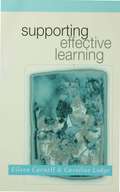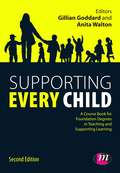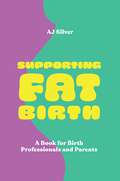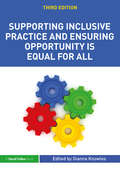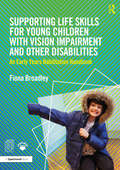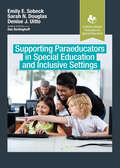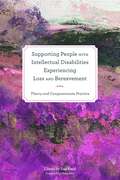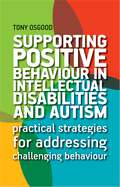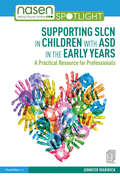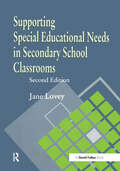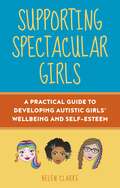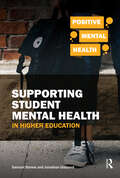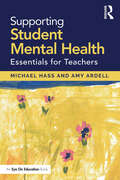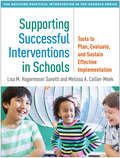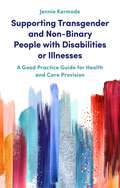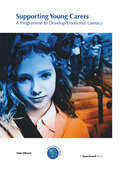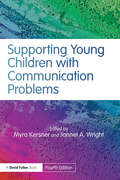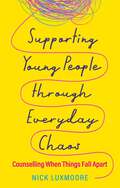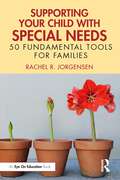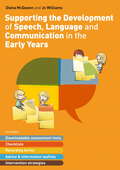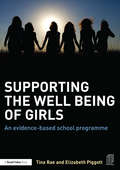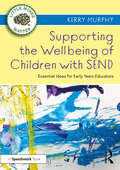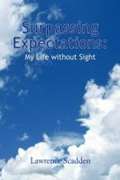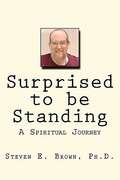- Table View
- List View
Supporting Effective Learning: Resources For Supporting Effective Learning
by Caroline M Lodge Dr Eileen Carnell`Teachers will find this book helpful because it locates convincing theoretical reasoning with the familiar practice of the learning environments of the secondary school. Many other learners, in formal education and beyond, might simply find the book an informative and challenging read.... The book provides more than a theoretical and ideological extension of a social constructivist of model learning. It identifies a realistic way forward. Perhaps it will have the impact it deserves' - British Journal Educational Psychology `Eileen Carnell and Caroline Lodge have given us a book with many virtues.... It is thoughtful and thought-provoking, and the many examples and case studies bring the theoretical discussions alive' - Ron Best, Cambridge Journal of Education `The overall style of the book is highly reader-friendly. The links between ideas are clear, the case studies are by and large helpful, and the bullet pointed practical strategies are substantial enough to give practitioners throughout the key stages new ideas to try. This is an intelligently written book which does much to further the effective learning debate' - Angela Scott, British Journal of Special Education 'This book is highly useful for teacher trainees (pre-service and in-service). School administrators will find it useful to develop a system that will help change focus from teaching to learning. Above all, anyone interested in student learning will find the volume extremely useful' - Sanjaya Mishra, British Journal of Educational Technology This teacher-friendly book focuses on learning at all levels in secondary schools. The authors are mainly concerned with how young people learn and how those in different roles in schools can promote their learning. They combine research with challenging ideas to stimulate tutors, subject teachers, team leaders and school managers as well as mentors and governors to think about their role in young people's learning. They examine these relationships within school and beyond its boundaries. The authors do this by drawing on different voices in secondary schools: young people, as well as parents, teachers and others who have a role in supporting young people's learning. This book will be essential reading for PGCE Secondary Students and practising teachers of the 11-16 age-range; local authority advisers and secondary school managers. Eileen Carnell has been involved for 25 years in teaching, professional development and educational research and is at present Senior Lecturer in Education at the Institute of Education, University of London. Caroline Lodge is Senior Lecturer in Effectiveness and Improvement, Associate Director of International School Effectiveness and Improvement Centre at the Institute of Education.
Supporting Every Child: A Course Book For Foundation Degrees In Teaching And Supporting Learning (Working with Children, Young People and Families LM Series)
by Anita Walton Gillian GoddardThis course book is for all degree students who are support staff, particularly teaching assistants (TAs), working in educational settings. It focuses on professional, academic and vocational issues that are common to support workers across the school sectors, and provides essential guidance on the increasingly complex role of all those involved in teaching and supporting learning. The reader is supported throughout by learning objectives, practical and reflective tasks, relevant case studies and chapter summaries. This new edition has been extensively revised to reflect recent changes in legislation, policy and the curriculum. It includes new or significantly amended chapters; on the development of support staff; supporting pupils in crisis; learning in the early years; inclusion, SEN and phonics. New to this edition: New legislation and policy changes mean updates required. Development of a new curriculum has brought changes.
Supporting Fat Birth: A Book for Birth Professionals and Parents
by AJ SilverThis pioneering guide provides birth professionals, pregnant people, and advocates with comprehensive insight into navigating conception, pregnancy, birth, and the perinatal period whilst fat. Drawing on the author's decade of experience as well as evidence-based research and case studies from people sharing their own perspectives and stories, this authoritative and compassionate book provides practical and effective advice on how to improve quality of care for fat parents. It covers a wide range of topics across the birth journey and beyond including interviews with a number of high-profile people including Nicola Salmon and Amber Marshall and empowers readers to feel reassured and confident in their choices and rights. This ground-breaking resource challenges the pervasive bias against fat service users in the birthing world and acts as a call to action to dismantle the fatphobic stigma present in our healthcare systems in order to create an environment that is inclusive of all bodies.
Supporting Grammar and Language Development in Children: A Guidebook for the Grammar Tales Stories (Grammar Tales)
by Jessica HabibThis guidebook has been created to accompany the Grammar Tales story books, a collection of beautifully illustrated picture books designed to support grammar and language development in children. Including accessible activities and ideas to help children use grammar forms expressively, the guidebook discusses the specific grammatical form focused on in each story, and offers support in using the storybooks effectively. Photocopiable and downloadable handouts for parents and carers allow therapy work to continue beyond the therapy session. This guidebook is an essential accompaniment to the Grammar Tales storybooks for Speech and Language therapists working with children.
Supporting Inclusive Practice and Ensuring Opportunity is Equal for All
by Gianna KnowlesThis third edition of Supporting Inclusive Practice builds on the successful format of the previous two editions, both in content and structure. It explores many aspects of inclusive practice relevant to those who work with children in schools and other educational settings, aiming to provide the most up-to-date theoretical knowledge and understanding in the field, and illustrating the theory with examples of good practice in the areas explored. Many of the topics that have appeared in the previous editions, including supporting children for whom English is a second language, children on the autistic spectrum and children with neurodiversity conditions, also appear in this edition. The revised content of this third edition also covers recent and relevant changes in national policy and legislation, particularly, for example, around changes in equality and disability, same-sex parenting and transgender children and parenting policy and legislation. It explores the impact on aspects of inclusive practice legislation such as the Equality Act 2010, Marriage (Same Sex Couples) Act 2013 and the Children and Families Act 2014. It also explores in detail the revised 2014 SEN Code of Practice and the introduction of the pupil premium in 2011, which provides support for the education of children from low income families or who may be children who are fostered or in care. Throughout, the book is informed by the solution-focused social model of special educational needs and disability, and reflects current national policy that sees inclusive practice as fundamental to ensure equality of educational opportunity is achieved for all children.
Supporting Life Skills for Young Children with Vision Impairment and Other Disabilities: An Early Years Habilitation Handbook
by Fiona BroadleyThis practical resource is designed to help professionals, parents and carers as they support children with vision impairments to develop independence in everyday tasks. Using the Early Years Foundation Stage framework as a basis, it provides a wealth of strategies and activities to develop key skills, including dressing, maintaining personal hygiene, eating and drinking and road safety. This is an invaluable tool that can be dipped in and out of to help make learning fun, boosting the child’s confi dence and helping create a positive ‘can- do’ attitude when faced with new challenges. This book: ◆ Addresses the main problem areas for babies and young visually impaired children and their families, by providing simple explanations of skills and offering strategies and techniques to support progression onto the next stage. ◆ Is written in a fully accessible style, with photocopiable pages and additional downloadable resources. ◆ Provides a variety of documentation to chart the child’s development and show progress over time. Research shows strong indicators that early intervention can reduce or eliminate developmental delays in children with a vision impairment. The supporting strategies in this book help busy professionals and carers to make every opportunity a learning opportunity, allowing children with a vision impairment to become confi dent and independent individuals.
Supporting Paraeducators in Special Education and Inclusive Settings (Evidence-Based Instruction in Special Education)
by Sarah Douglas Emily Sobeck Denise UittoSupporting Paraeducators in Special Education and Inclusive Settings provides an in-depth look at the role of pre- and in-service teachers as supervisors of paraeducators within special education and inclusive settings.The latest entry within the Evidence-Based Instruction in Special Education series, Supporting Paraeducators in Special Education and Inclusive Settings serves as an instructional tool for pre-service teachers and educators within higher education coursework, as well as a resource for in-service teachers. This text supports teachers in strengthening their knowledge and supervisory skills necessary to supervise and manage paraeducators in educational environments.Through objectives, scenarios, content, and chapter questions, Drs. Sobeck, Douglas, and Uitto provide a thorough and applicable overview of working with and supervising paraeducators. In this text the roles and responsibilities of paraeducators, teachers, and school administrators relative to paraeducator training and supervision will be detailed, as well as tips for collaboration.Included with the text are online supplemental materials for faculty use. School leaders and higher education faculty can use the online site for materials to support pre-service training within teacher preparation programs and professional development for in-service teachers.Supporting Paraeducators in Special Education and Inclusive Settings fills an important need in the field and is a vital resource for current and future teachers when working with paraeducators.
Supporting People with Intellectual Disabilities Experiencing Loss and Bereavement: Theory and Compassionate Practice
by Philip Dodd Erica Brown Linda Machin Patsy Corcoran Karen Ryan Mandy Parks Mary Davies Sue Read William Gaventa Professor Owen Barr Ben Hobson Suzanne Guerin Ted Bowman Michele Wiese Philip J Larkin Helena Priest Mike Gibbs Rachel Forrester-Jones Noelle BlackmanExploring contemporary theory and practice surrounding loss and bereavement for people with intellectual disabilities (ID), this book brings together international contributors with a range of academic, professional and personal experience. This authoritative edited book looks at diverse experiences of loss across this population whether it be loss due to transition, the loss or death of others, or facing their own impending death. The book begins by offering theoretical perspectives on loss and compassion, bereavement, disenfranchised grief, spirituality, and psychological support. It then addresses contemporary practice issues in health and social care contexts and explores loss for specific communities with ID including children, individuals with autism, those in forensic environments, and those at the end of life. Identifying inherent challenges that arise when supporting individuals with ID experiencing loss, and providing evidence and case studies to support best practice approaches, this book will be valuable reading for students, academics and professionals in the fields of disability, health and social care.
Supporting Positive Behaviour in Intellectual Disabilities and Autism: Practical Strategies for Addressing Challenging Behaviour
by Tony OsgoodThis highly practical book is an accessible and grounded handbook for addressing challenging behaviour in children and adults with intellectual or developmental disabilities (IDD), including autism. It recognises that challenging behaviour does not appear out of nowhere and is meaningful for the person exhibiting it. Behaviour can be communicative and an important signifier of underlying sensory or environmental issues. Focusing on a person-centred approach throughout, the book has advice and strategies for working with the client's families, support staff and professionals. It also presents best practice for analysing and addressing challenging behaviour in various settings such as schools, hospitals and the home, all while stressing the need to keep the human story at the heart of any assessment and intervention. Each chapter features questions for discussion or reflection and exercises for the reader to complete. Informal, frank and free of jargon, this is indispensable for professionals, parents, and anyone working with people with intellectual disability or autism.
Supporting SLCN in Children with ASD in the Early Years: A Practical Resource for Professionals (nasen spotlight)
by Jennifer WarwickWith growing numbers of children with autism spectrum disorder (ASD) being diagnosed in the early years, it is becoming increasingly important for education and health professionals to understand ASD and to implement supportive strategies as part of the everyday curriculum and routine. This book serves as an essential tool kit for anyone working with young children with ASD and speech, language, and communication needs (SLCN). Filled with practical and up-to-date tips, advice, and guidance, it shifts the responsibility of change from the child onto the caregiver, asking the question: what can we do to support the child? Key features of this book include the following: An introduction to ASD Detailed case studies illustrating the varied impacts ASD can have on the life of a child Practical activities and resources, including planning sheets and activity suggestions Easy-to-follow chapters focusing on the classroom environment, communication, social interaction, play, and behaviour Comprehensive, practical, and evidence based, this manual is essential reading for anyone working with children experiencing social communication difficulties and ASD in an early years setting.
Supporting Special Educational Needs in Secondary School Classrooms
by Jane LoveyTeachers and support teachers in secondary schools can use this book to maximize the impact and effectiveness of their work together. The author looks at a broad range of special needs and offers support strategies that work in a mainstream classroom. Informed by the latest research and updated in the light of the new revised Code of Practice, this new edition explains students' difficulties and contains advice on good classroom practice. It will help the reader to support any student with special educational needs. Teachers, Teaching Assistants and SENCOs will find this book particularly helpful. For specialist study, there is a list of further reading at the end of each chapter. SEN governors in schools will also find this a useful overview of the breadth of special needs for which their school could be expected to cater.
Supporting Spectacular Girls: A Practical Guide to Developing Autistic Girls' Wellbeing and Self-Esteem
by Helen ClarkeAutistic girls can be frequently misunderstood, underestimated and therefore anxious in a school environment. This practical book offers an innovative life skills curriculum for autistic girls aged 11 to 15, based on the author's successful workshops and training, which show how to support girls' wellbeing and boost their self-esteem.Including an adapted PSHE curriculum, this is a straightforward guide to educating autistic children on the issues that matter most to them. It covers all essential areas of wellbeing, including communication, identity, self-regulation and triggers, safety, and physical and mental health, and offers the reader strategies to help the autistic girls in their lives enhance and develop these.
Supporting Student Mental Health in Higher Education
by Jonathan Glazzard Samuel StonesStudent mental health is a key consideration in higher education at the moment with recent reports identifying a major gap in provision by universities and how ill-equipped academics feel to support students. This book addresses these concerns, providing comprehensive guidance and workable evidence-informed strategies and interventions to help those working with students to support them effectively. It is suitable for lecturers, personal tutors, student counsellors, course leaders, heads of department and administration staff with responsibility for student support.
Supporting Student Mental Health: Essentials for Teachers
by Michael Hass Amy ArdellSupporting Student Mental Health is a guide to the basics of identifying and supporting students with mental health challenges. It’s no secret that your responsibilities as a teacher go beyond academic achievement. You cover key socioemotional competencies in your classrooms, too. This book is full of accessible and appropriate strategies for responding to students’ mental health needs, such as relationship-building, behavioral observation, questioning techniques, community resources, and more. The authors’ public health, prevention science, and restorative practice perspectives will leave you ready to run a classroom that meets the needs of the whole child while ensuring your own well-being on the job.
Supporting Successful Interventions in Schools: Tools to Plan, Evaluate, and Sustain Effective Implementation (The Guilford Practical Intervention in the Schools Series)
by Lisa M. Sanetti Melissa A. Collier-MeekEvidence-based interventions benefit learners only when they are implemented fully. Yet many educators struggle with successful implementation. This unique book gives practitioners a research-based framework for working with PreK–12 educators to support the effective delivery of academic, behavioral, and social–emotional interventions. Step-by-step procedures are presented for assessing existing implementation efforts and using a menu of support strategies to promote intervention fidelity. In a large-size format with lay-flat binding for easy photocopying, the book includes 28 reproducible worksheets, strategy guides, and fidelity assessment tools. Purchasers get access to a Web page where they can download and print the reproducible materials. This book is in The Guilford Practical Intervention in the Schools Series, edited by T. Chris Riley-Tillman.
Supporting Transgender and Non-Binary People with Disabilities or Illnesses: A Good Practice Guide for Health and Care Provision
by Jennie KermodeSupporting Transgender and Non-Binary People with Disabilities or Illnesses
Supporting Young Carers: A Programme to Develop Emotional Literacy
by Clare WillcockThis easy to use resource pack is designed for young people aged 6-16 who have a caring responsibility for someone at home. It is best used during one-to-one support sessions. Topics covered include: caring and emergencies, school and friends, personal health, support at home and ways of coping, identifying feelings, self-esteem and self image. By increasing the young person's self-knowledge and recognition of feelings as well as offering practical suggestions and information, this pack enables the young carer to review their own situation, to feel more in control and to come to their own decisions regarding any change that might benefit them.
Supporting Young Children with Communication Problems
by Myra Kersner Jannet A. WrightNow in its fourth edition, formerly published as How to Manage Communication Problems in Young Children, this invaluable guide to understanding and helping children whose speech and/or language is delayed or impaired has been completely revised and updated, and provides readers with: Practical advice on how to recognise communication problems Strategies for supporting children with speech, language and communication needs Best practice guide for parents and professionals working in partnership Contributions from a wide-range of specialist speech and language therapists Reflecting new developments and current practice, this book is of interest to parents, early years’ practitioners, students in education and speech and language therapy, and anyone interested in pursuing a career with young children in the foundation years. Written in an accessible style, it assumes no prior knowledge and includes a range of practical suggestions for dealing with children with all kinds of communication difficulties.
Supporting Young People through Everyday Chaos: Counselling When Things Fall Apart
by Nick LuxmooreThis book provides ways to support and counsel young people struggling to adapt and live with the constant possibility of things breaking down, of normal life being overtaken by chaos. Covering many different types of 'everyday chaos' including anxiety, bullying, mental health, trauma, anger and loss, this book is an incredibly useful guide for anyone working with young people at a time when these issues are more prevalent than ever. It was inspired by the author's daughter's accidental death aged 27. Written in a warm and down-to-earth tone, the chapters use a variety of case studies to lead through examples on a range of problems young people are facing.
Supporting Your Child with Special Needs: 50 Fundamental Tools for Families
by Rachel R. JorgensenSupporting Your Child with Special Needs offers practical activities and strategies to help you prepare your children for school success and best connect with school personnel to meet your child's unique needs. Each of the ten chapters includes key themes supported by research as well as activities for you to complete with your children to bond with and build them up. Rachel Jorgensen's guidance will help you both understand and tackle the real-world situations you'll encounter as a parent navigating the special education system. You will find yourself better equipped to support your child in the school setting and better able to prepare your child for a path to greater independence in adulthood.
Supporting the Development of Speech, Language and Communication in the Early Years: Includes Downloadable Assessment Tools, Checklists, Recording Forms, Advice and Information Leaflets and Intervention Strategies
by Jo Williams Diana McQueenSpeech and language impairment can have a huge impact on cognitive development. Identifying what is going wrong and what effective intervention looks like can be daunting. Short of retraining you as a speech and language therapist, this thorough guide will give you everything you need to change that.An essential resource, the book contains a wide variety of online resources, including phonological and sound awareness documents, assessment tools, and recording forms that can be downloaded straight to your device, providing excellent materials and activities to use in the classroom.Written by speech and language therapists and designed exclusively for Early Years practitioners, this book provides a complete overview of how children acquire language and what language impairments look like at this age. You will find both strategic and practical advice on how to manage and encourage the development of speech and language skills. Creating the optimum communication environment for every child in your setting is an important part of what the book offers. Equally, practitioners are supported to be able to recognise the features of specific language difficulties such as Developmental Language Disorder (DLD) and feel confident to intervene when children are struggling.
Supporting the Well Being of Girls: An evidence-based school programme
by Tina Rae Elizabeth PiggottSupporting the Well being of Girls will provide teachers, psychologists, youth workers and learning mentors with an evidence based approach to the vitally important task of supporting and maintaining the well being of girls. This tried and tested programme offers teachers in upper primary and secondary schools sixteen tailored, expert sessions which engage girls and young women in tackling and addressing some of their key concerns and issues. Written by hugely experienced educational psychologists, the sessions utilise tools and strategies from a range of therapeutic interventions including cognitive behavioural therapy and positive psychology to provide a safe and nurturing environment in which to consider some sensitive issues and ultimately providing young women with the strength and self awareness to maintain overall well-being. Areas covered include:- • Body image and appearance• Bullying• Mental health, anxiety and depression• Relationships• Stereotypes• Self-harm• Stress• Healthy Living Throughout, clear guidance is offered to teachers on running sessions including, welcome and ground rules, talk time and inviting students to share experiences, ice-breakers, activities and feedback. This programme of support also includes a full range of support tools for the school including:- • Information sheet for students• Information sheet for parents• Letter to parents• Mental health fact sheet• Referral routes to specialist agencies• Mental health agencies – contact details• Policy for schools on developing mental health work
Supporting the Wellbeing of Children with SEND: Essential Ideas for Early Years Educators (Little Minds Matter)
by Kerry MurphyAs an early years practitioner, you will educate and care for children with a range of developmental needs and differences. This essential book introduces you to a play-rich approach providing both universal and targeted ideas that will support social and emotional development and ensure that children feel safe, secure, and nurtured. Using the four broad areas of need as a guide, each accessible chapter positions wellbeing at the heart of an effective approach to inclusion and offers meaningful and responsive teaching practices that create a sense of belonging and acceptance. Founded in the latest research, the book presents key knowledge alongside ideas and activities to support wellbeing, which can be embedded into the child’s everyday experiences and adapted to meet their individual needs. This book offers: Evidence-based strategies and techniques that have a positive impact on the long-term social and emotional wellbeing of children with SEND. Guidance through the four broad areas of need, with a focus on play, learning, and developing an emotionally healthy early years environment. Examples of practice in action. Case studies, reflective questions, and activities that will upskill the reader and empower them in their role. Providing up to date, transferrable and essential knowledge on SEND in the early years, this is an essential resource for any practitioner looking to expand their repertoire and enrich the wellbeing of children with SEND.
Surpassing Expectations: My Life without Sight
by Lawrence ScaddenThe booktells the story of the author's life without sight,a memoir that recalls the activities that brought him international acclaim as a scientist, policymaker, and advocate.
Surprised to be Standing: A Spiritual Journey
by Steven E. BrownA mysterious limp when I was five would be diagnosed as a rare genetic disease, foreshadowing decades of excruciating bone pain and accelerating immobility. In my mid-forties not even the most sophisticated medical technology could detect my bone density, which shocked me into digging deep inside to tackle longstanding, but often ignored, personal angers and sorrows and choose between submitting to a life of ongoing pain and desperation or propelling myself into healing and liberation.
